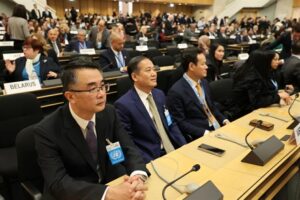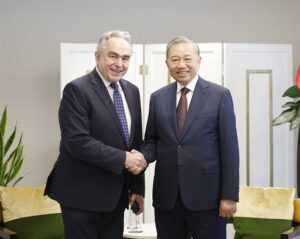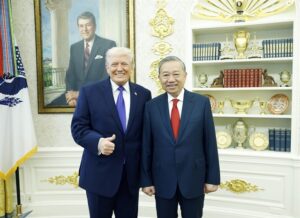PM Chính Engages Cần Thơ Voters in Landmark Science and Technology-Focused Meeting

Cần Thơ, The Gulf Observer: Prime Minister Phạm Minh Chính, alongside the delegation of National Assembly (NA) deputies from Cần Thơ City, held a high-level voter meeting on July 13 with more than 1,000 local constituents, including lecturers, researchers, civil servants, and professionals from universities, colleges, and scientific institutions.
This marked the third voter engagement of Cần Thơ’s NA delegation following the 9th session of the 15th National Assembly, and notably the first session dedicated specifically to the theme of science and technology. It was also the Prime Minister’s first direct dialogue with voters in Cần Thơ following the administrative merger of the former Cần Thơ City with Hậu Giang and Sóc Trăng provinces.
During the meeting, delegates updated voters on the results of the recently concluded 9th session of the 15th NA, which spanned 35 working days and saw the adoption of 34 laws and 14 legal resolutions. The session also included reviews of six draft laws and the ratification of a resolution to amend key articles of the 2013 Constitution.
A major outcome of the session was the NA’s decision to shorten the current legislative and local council terms (2021–2026), confirming the general election for the next term will take place on Sunday, March 15, 2026.
The Cần Thơ NA delegation currently comprises 21 members, including Prime Minister Phạm Minh Chính and NA Chairman Trần Thanh Mẫn.
Reporting on local implementation of national policies, the delegation highlighted the progress in science, technology, innovation, and digital transformation—particularly the enforcement of Resolution 57-NQ/TW issued by the Politburo on December 22, 2024.
Voters voiced concerns on a wide range of issues, including the inadequacy of scientific research funding, barriers to the commercialisation of research outcomes, digital skills development, and challenges in retaining highly skilled talent in the science and technology sector.
In response, PM Chính and senior officials outlined a series of strategic measures aimed at tackling these concerns. These include reforms to the research grant mechanism, removing financial bottlenecks, and fostering greater participation from the private and social sectors in innovation initiatives.
Prime Minister Chính emphasized the Government’s commitment to raising science and technology investment, with planned spending to increase from 3 per cent of the state budget in 2024 to 5 per cent in 2025. He also announced the introduction of tax incentives, preferential credit packages, simplified visa procedures, and improved housing policies to attract and retain overseas Vietnamese experts.
The Prime Minister identified priority areas for development, including semiconductor technology, artificial intelligence, intellectual property protection, and the establishment of a robust collaborative framework among the “four pillars” of scientific development—government, academia, industry, and the public.
Highlighting recent national achievements, he reaffirmed Việt Nam’s position as a politically stable and economically dynamic country. The national GDP is projected to lead the ASEAN region and remain among the fastest-growing globally.
PM Chính also noted the Government’s progress in eradicating substandard housing for policy-beneficiary groups, with completion expected ahead of schedule, and praised the effectiveness of the new two-tier local government model now in place.
Commending Cần Thơ’s increasing contributions to national development, the Prime Minister called on the city to take a leading role in science, technology, innovation, and digital transformation. He urged local authorities to accelerate the revival of the stalled Cần Thơ Oncology Hospital project, push forward the one-million-hectare high-quality, low-emission rice production programme for the Mekong Delta, and scale up educational initiatives such as the “Digital Literacy for All” programme.
He also encouraged Cần Thơ University to establish digital transformation support teams to assist communities and play a leading role in nurturing talent for the semiconductor industry and the digital economy.
The meeting concluded with renewed commitments from both local and national leaders to drive innovation, address grassroots concerns, and ensure inclusive development through science and technology.


